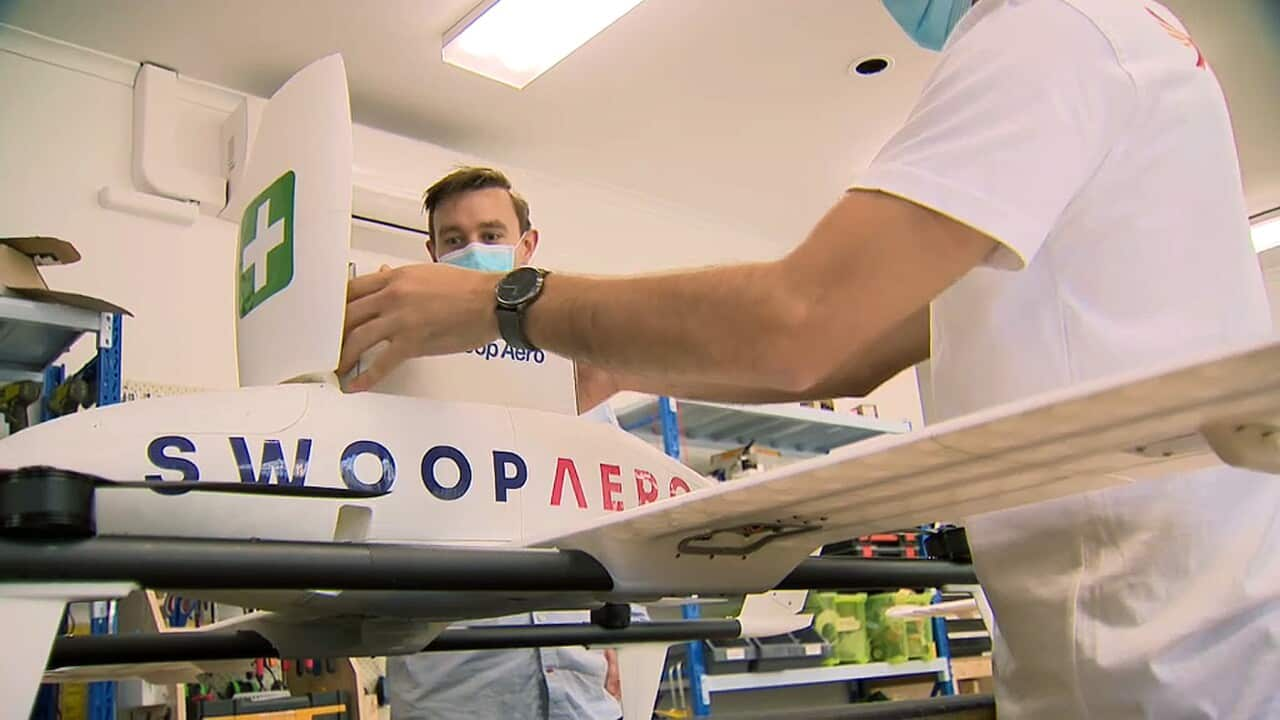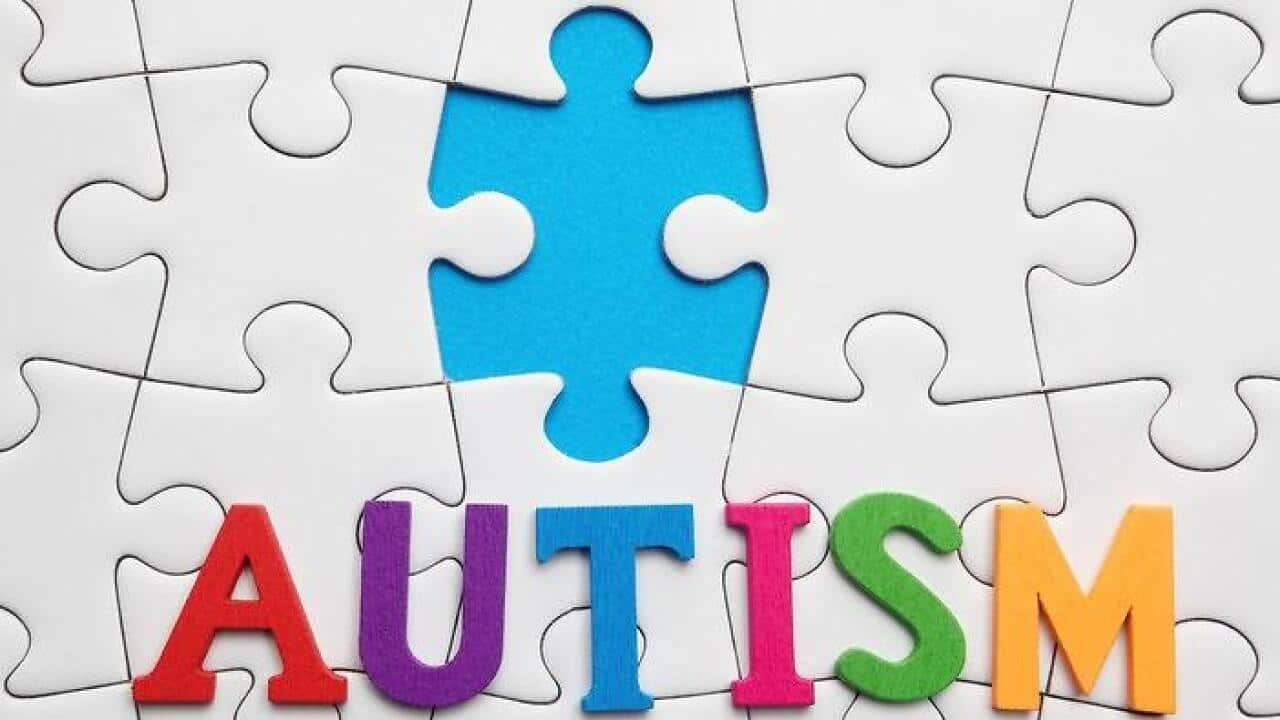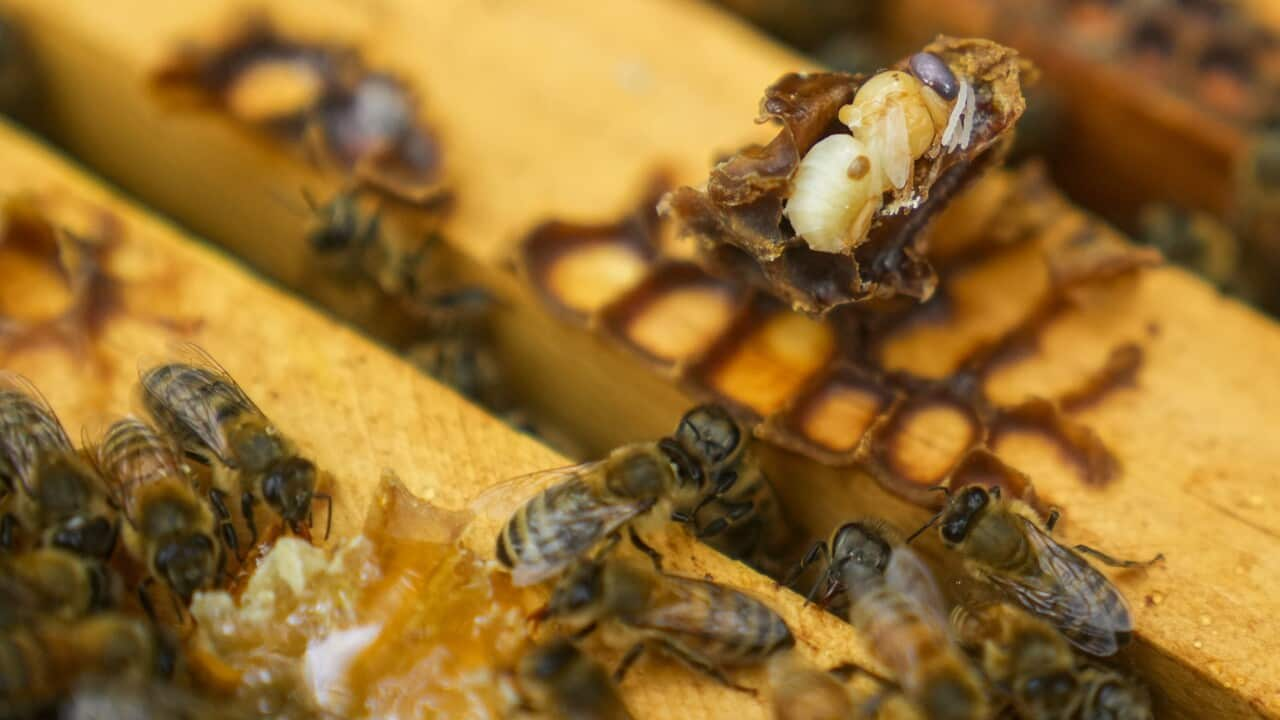Italian
Drone buzzing ... fade under
Potrebbe non essere l'iconica risata di un kookaburra.
Ma quel suono è il motore del drone kookaburra di fabbricazione australiana.
L'aereo costruito su misura e stampato in 3D è progettato per recapitare medicinali essenziali alle persone nelle aree rurali e remote.
"So one of the big problems in rural areas is the tyranny of distance, people go without their medication, because it is just too hard and too far, and it takes too long to get it, so they're just used to going without."
Questa è Lucy Walker, una farmacista nella città di Goondiwindi nel Queensland meridionale.
La sua farmacia sarà il sito di prova per le consegne di droni a maggio.
"I am actually from Brisbane, from the city, so when I came out here, I would sigh, as it is just not the best care and the people out here deserve better, so if we can use technology to actually improve patient care I am all for it."
I droni sono sviluppati da Swoop Air e l’amministratore delegato Eric Peck dice che possono consegnare medicinali in fattorie rurali fino a 130 chilometri di distanza.
"The aircraft will take off, fly along a highway in the sky, effectively, to the destination and transition to hover, land like a helicopter on site, it'll either drop the payload off and fly away on its own or if it is a bigger payload, loaded in the top, the person will be able to walk up to it, take a little box of medication out, press a button and send the aircraft back home."
I piloti saranno in grado di far volare fino a 30 di questi droni contemporaneamente dalla sede del Victoria – ovunque in Australia.
"We've tried to make the system as highly autonomous as we can, so the aircraft themselves are just basically flying robots. They have got on-board computer and an intelligence set that we have coded in there that monitors how they are preforming, makes sure they are safe and everything is operating and if something is going to go wrong, or something is not looking good they will make the safest decision by themselves."
Swoop Aero fornisce forniture mediche in Africa da un anno e mezzo e non è l'unica azienda che utilizza la tecnologia.
Durante la pandemia, il governo cileno ha usato i droni per consegnare medicinali agli anziani.
E nel Northern Territory è in corso anche un’altra prova per fornire medicinali a comunità remote spesso isolate durante la stagione delle piogge.
Peta Rutherford della Rural Doctors Association ritiene che i droni siano il logico passo successivo, dopo il progresso della telemedicina quest'anno.
"It seemed a little bit strange that you could do your consultation be telehealth, your script could be delivered through an e-prescribing arrangement to the chemist, but then you still had to drive in 100km or 200km to get into town to collect your medication. So this is just another exciting development I guess in the telehealth service, and obviously there is some security and some requirements and some guidelines to be met through this service, but it is certainly one that we welcome."
La compagnia di droni sta lavorando con la Civil Aviation Safety Authority per l'approvazione all’inizio dei voli.
English
Drone buzzing ... fade under
It might not be the iconic laugh of a kookaburra.
But that sound is the engine of the Australian-made kookaburra drone.
The custom built and 3D printed aircraft is designed to deliver essential medicines to people in rural and remote areas.
"So one of the big problems in rural areas is the tyranny of distance, people go without their medication, because it is just too hard and too far, and it takes too long to get it, so they're just used to going without."
That's Lucy Walker, a pharmacist in the south Queensland town of Goondiwindi.
Her pharmacy will be the trial site for the drone deliveries in May.
"I am actually from Brisbane, from the city, so when I came out here, I would sigh, as it is just not the best care and the people out here deserve better, so if we can use technology to actually improve patient care I am all for it."
The drones are developed by Swoop Air and CEO Eric Peck says they can deliver medicines to remote stations up to 130 kilometres away.
"The aircraft will take off, fly along a highway in the sky, effectively, to the destination and transition to hover, land like a helicopter on site, it'll either drop the payload off and fly away on its own or if it is a bigger payload, loaded in the top, the person will be able to walk up to it, take a little box of medication out, press a button and send the aircraft back home."
Pilots will be able to fly up to 30 of these drones at one time from the Victorian headquarters - anywhere in Australia.
"We've tried to make the system as highly autonomous as we can, so the aircraft themselves are just basically flying robots. They have got on-board computer and an intelligence set that we have coded in there that monitors how they are preforming, makes sure they are safe and everything is operating and if something is going to go wrong, or something is not looking good they will make the safest decision by themselves."
Swoop Aero has been deliver medical supplies in Africa for a year and a half and it isn't the only company using the technology.
During the pandemic, the Chilean government used drones to deliver medicines to the elderly.
And a separate trial is also underway in the Northern Territory, to provide medicines to remote communities often isolated during the wet season.
The Rural Doctors Association's Peta Rutherford believes the drones are the logical next step, after the advancement of telehealth this year.
"It seemed a little bit strange that you could do your consultation be telehealth, your script could be delivered through an e-prescribing arrangement to the chemist, but then you still had to drive in 100km or 200km to get into town to collect your medication. So this is just another exciting development I guess in the telehealth service, and obviously there is some security and some requirements and some guidelines to be met through this service, but it is certainly one that we welcome."
The drone company is working with the Civil Aviation Safety Authority for approval to start flying.
Report by Lucy Murray




